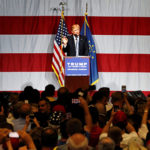Before the 2016 election, Nikki Toyama-Szeto had thought of the term “evangelical” as neutral. “It was about theology,” she told me recently. She had a long history working with evangelical organizations like International Justice Mission and Intervarsity, and as the executive director of Evangelicals for Social Action, she was a well-known speaker and activist in evangelical circles. Her faith had been central to affirming her own racial identity and gender. “For myself, as a person of color, as an evangelical, I would say that I actually discovered my identity as an Asian American woman in the context of my faith,” she told me. “General, secular American society was saying you are invisible, or you can be either a newscaster or you can be the ‘dragon lady.’ It was in the context of my faith that I found out, ‘Oh, God created my gender and my ethnicity to be a gift for me.’”
Then, with the election of Donald Trump and her awareness that white evangelicals had voted for him overwhelmingly, she said, “I became suspicious that we don’t have each other’s back. I thought we did.” She kept thinking of white believers: “If you voted for Trump, then his racism was just not a deal-breaker for you. When push comes to shove, I feel like you threw me under the bus.”
President Trump’s support among white evangelicals remains strikingly strong (with 75 percent voicing their approval in April), but as commentators and the press continue to unpack their dedication to Trump, another set of statistics is getting far less attention: According to Pew Research, almost 25 percent of American evangelicals are not white, and they voted quite differently. (Another poll from PRRI puts the percentages of people of color far higher, saying that 46 percent of U.S. evangelicals are black, Asian, Latino, or otherwise non-white. The poll’s method was to count as evangelical any person who identifies as Protestant and who answers “yes” when asked if they are evangelical or born again.)
Not surprisingly, but importantly, Trump’s support among evangelicals of color is dramatically lower than among white evangelicals.
Continue reading this article at Religion & Politics.














We seek to connect God’s story and God’s people around the world. To learn more about God’s story, click here.
Send comments and feedback to Eric Black, our editor. For comments to be published, please specify “letter to the editor.” Maximum length for publication is 300 words.